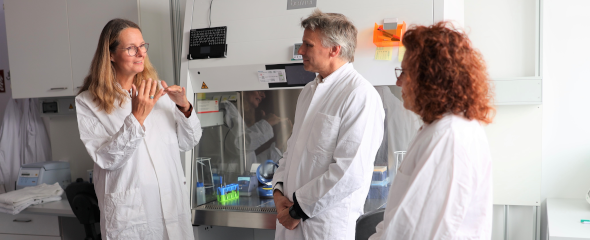"In Greifswald, a state-of-the-art and world-leading center for infectious disease research will be established in the coming years. If we look at the past years marked by Corona, research into infectious diseases that are transmitted from animals to humans and vice versa is more topical and important than ever, and globally," says Bettina Martin.
"For this reason, and based on scientific recommendations, the new Helmholtz Institute will take a more comprehensive, interdisciplinary approach to addressing the health challenges posed by zoonotic infectious diseases than originally planned. The research center will be equipped with dedicated BSL-3 (biosafety level 3) high-security laboratories. The new HIOH is of great importance for Mecklenburg-Western Pomerania as a science location and for global infection research. For this reason, the state has decided to cover the extended construction costs of 15 million euros on its own after the federal government refused to assume a share of the costs. Every euro we invest in the major future field of research at the interface between animals, humans, and their environment is worthwhile. The HIOH attracts top scientists from all over the world and establishes a research network of high international importance in Greifswald," Martin announced today.
Prof Fabian Leendertz, founding director of the Helmholtz Institute for One Health in Greifswald said: "We are very pleased that with the support of the state we have the opportunity to establish a research institute that contributes to pandemic preparedness and prevention. We know that human and animal health can no longer be considered in isolation but are closely linked to each other as well as the environment. Our research is dedicated to the basic mechanisms of the emergence and transmission of infectious diseases transmissible between humans and animals, as well as antimicrobial resistance."
"The University of Greifswald supports the establishment of the Helmholtz Institute for One Health as a close cooperation partner. Greifswald benefits from complementary One Health expertise on site, so that major societal challenges such as the global increase in infectious diseases can be jointly addressed," said Prof Katharina Riedel, Rector of the University of Greifswald.
The Helmholtz Institute for One Health (HIOH) Greifswald is a branch of the Helmholtz Centre for Infection Research (HZI) Braunschweig and is closely linked to the University of Greifswald, the University Medical Center Greifswald, and the Friedrich-Loeffler-Institute by a cooperation agreement. The founding ceremony took place in April 2022. Since then, the HIOH has been working in interim laboratories. The research team now consists of 65 international scientists. The new institute building will be located on the Beitzplatz campus in Greifswald. In order to be able to conduct research on pathogens such as the SARS CoV-2 or other hazard-class viruses, the building will have BSL-3 laboratories in addition to BSL-2 ("biosafety-level") laboratories. For example, the majority of emerging human pathogens are BSL-3 (e.g., SARS-CoV-2, highly pathogenic influenza viruses, hantaviruses, monkeypox, etc.). It is also becoming increasingly necessary to study germs with a high degree of resistance to pharmaceuticals in BSL-3 laboratories. The office and laboratory building will comprise around 2,600 m2 of usable space and will be built by the HZI's construction administration.
The original construction costs amounted to 23 million euros, half of which will be borne by the federal government and half by the state of Mecklenburg-Western Pomerania. With the additional commitment of the state of Mecklenburg-Western Pomerania amounting to 15 million euros, the anticipated total construction costs of 38 million euros can now be financed. In addition, start-up financing for the operation and ongoing investments of the research center will amount to around 36 million euros, of which 90 percent will be borne by the federal government and 10 percent by the state.
To the press release (in German) by the Ministry of Science, Culture, Federal and European Affairs in Mecklenburg-Vorpommern
